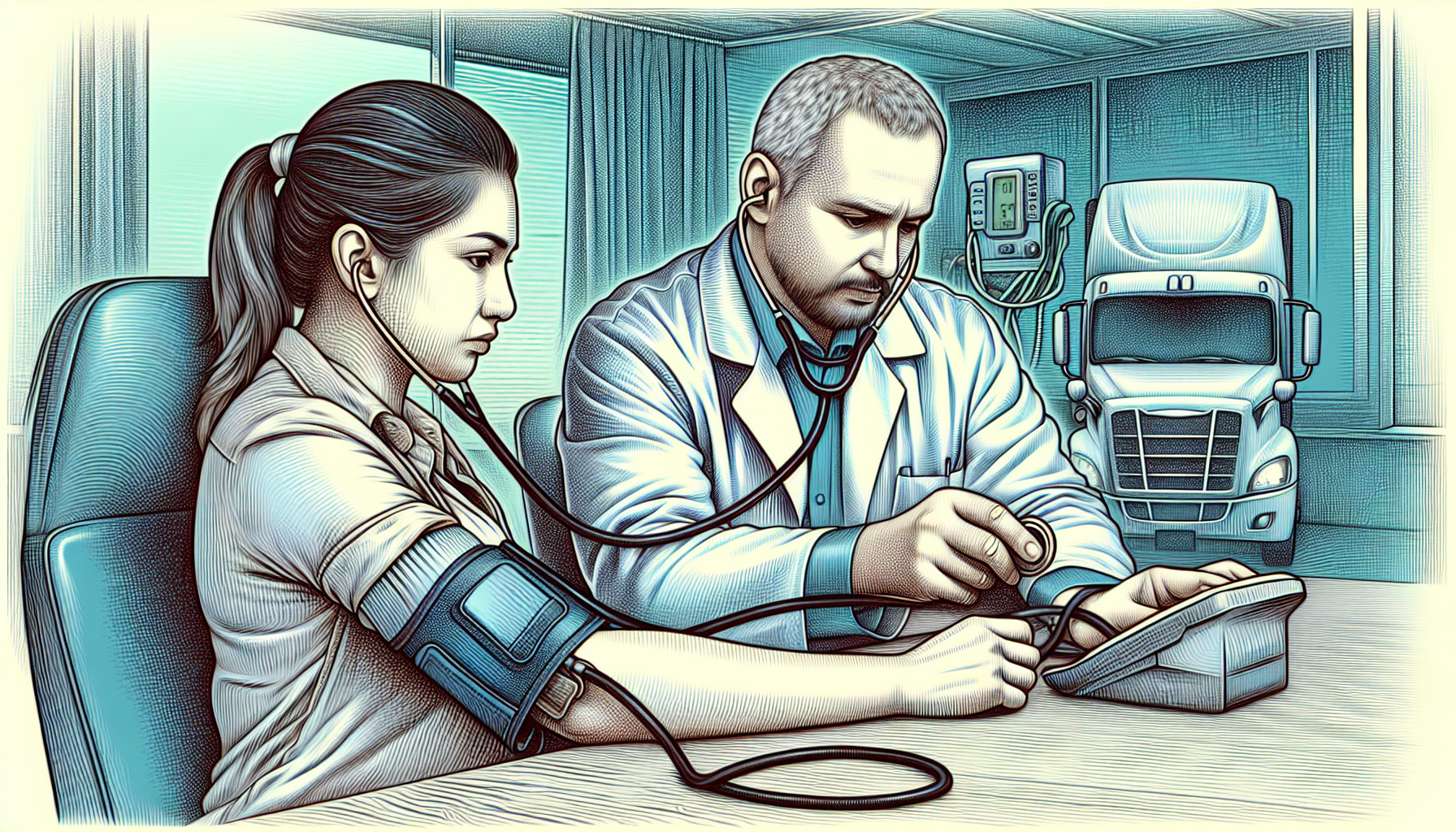If you’re wondering “how many 3 month dot medical cards can you have?”, the answer is just one. This regulation is to ensure drivers address health issues promptly. In this article, we’ll walk you through why this rule is important, what it means for your health and career, and how to navigate the steps following the issuance of a 3-month card.
Key Takeaways
- Drivers are allowed only one 3-month DOT medical card, which is intended to provide time to address health concerns and is not meant to be a recurring solution.
- Receiving a 3-month DOT medical card places a responsibility on drivers to actively manage their health conditions and demonstrate significant progress within the three-month period to qualify for a longer-term certification.
- Failure to address health issues promptly or attempting to obtain multiple 3-month medical cards can result in serious repercussions, including disqualification from operating a commercial vehicle and potential fines.
How Many 3 Month DOT Medical Cards Can You Have? Essential Facts and Tips

The rule is clear regarding 3-month DOT medical cards: you’re only allowed to have one. This limitation is not arbitrary but designed with your health and safety in mind. The Federal Motor Carrier Safety Administration (FMCSA) has put this rule in place to ensure that drivers address their health concerns promptly and effectively.
The 3-month DOT medical card is a temporary measure, a bridge between identifying a health concern and resolving it. It’s not meant to be a recurring solution but rather a one-time opportunity to get your health back on track. This short-term certification allows you to continue driving while you work on improving your health condition. Yet, it is fundamental to comprehend that significant progress in managing your health issue is expected by the end of these three months. If you haven’t, you may face challenges in obtaining further certification, which could impact your ability to continue your career as a commercial driver.
Introduction
The DOT medical card is not just a simple document—it signifies your fitness as a commercial driver. This certification is the result of a comprehensive physical examination designed to evaluate your ability to safely operate a commercial motor vehicle. The exam isn’t just a kidney screen or a quick once-over; it’s an extensive examination that assesses various aspects of your health, including:
- Vision
- Hearing
- Cardiovascular health
- Respiratory health
- Musculoskeletal health
- Neurological health
- Mental health
For drivers operating vehicles that require a commercial driver’s license (CDL) or those driving vehicles over 10,000 pounds across state lines, the DOT medical card is not optional—it’s a federal requirement. This certification, also known as a medical examiner’s certificate, serves as proof that you’ve met the medical standards set by the FMCSA. It serves as a vital part of your professional qualifications, guaranteeing that you’re physically fit to handle the rigors of road life.
Remember, your health isn’t just about you—it’s about the safety of everyone sharing the highway with you.
Understanding the 3-Month DOT Medical Card

While a standard DOT medical card typically grants certification for up to 24 months, there are instances where a shorter certification period is necessary. This is where the 3-month DOT medical card comes into play. This short-term certification is a special provision designed to address specific health concerns that require closer monitoring.
The 3-month DOT medical card isn’t an inferior form of the standard card, but a mechanism that permits drivers with specific health issues to continue their work while managing these concerns. It’s important to note that you can only have one 3-month DOT medical card, which serves as a valid medical card during this period. This limitation underscores the temporary nature of this certification and the expectation that the underlying health concern will be addressed promptly.
What is a 3-Month DOT Medical Card?
A 3-month DOT medical card is a temporary certification issued to commercial drivers who meet the basic requirements for operating a commercial motor vehicle but have a health condition that requires closer monitoring. This short-term medical card, also known as a DOT medical certificate, is valid for exactly what its name suggests—three months. It’s a proactive measure that allows drivers to continue their professional duties while addressing specific health concerns.
The issuance of a 3-month card doesn’t mean a driver is unfit for duty. Rather, it indicates that a medical examiner has identified a condition that needs to be managed or resolved in the short term. This could be anything from slightly elevated blood pressure to a newly diagnosed condition that requires treatment adjustment. The 3-month period gives drivers time to work with their healthcare providers to bring their condition under control, with the goal of qualifying for a longer-term medical card at their next DOT physical exam.
Health Conditions Requiring a 3-Month DOT Medical Card

Several health conditions can lead to the issuance of a 3-month DOT medical card. One of the most common is hypertension, particularly stage 2 hypertension. If your blood pressure reading falls between 160-179 systolic and/or 100-109 diastolic, you may be restricted to a 3-month certification. This gives you time to work with your healthcare provider to bring your blood pressure under control, whether through lifestyle changes, medication adjustments, or a combination of both.
Heart conditions are another area of concern that might result in a 3-month card. If you have a history of heart issues or have recently been diagnosed with a heart condition, your medical examiner may require specific documentation and opt for a shorter certification period to ensure your condition is stable and well-managed. Similarly, sleep disorders like sleep apnea can lead to a 3-month certification. In such cases, you may need to provide your latest sleep test results and demonstrate that you’re complying with prescribed treatments, such as using a CPAP machine.
It’s important to understand that the 3-month DOT medical card is not a punitive measure. Rather, it’s a tool that allows drivers to continue working while addressing health concerns that could potentially impact their ability to safely operate a commercial vehicle. The shortened certification period ensures that these conditions are closely monitored and effectively managed. Remember, the ultimate goal is to help you achieve a level of health that allows for a longer certification period, typically 12 or 24 months.
Monitoring and Follow-Up Requirements
Receiving a 3-month DOT medical card signifies an agreement that you’ll actively manage your health condition during this timeframe, with or without the support of medical insurance. Regular follow-up appointments with your healthcare provider are crucial. These check-ups allow for ongoing monitoring of your condition and provide opportunities to adjust your treatment plan if necessary. The frequency of these appointments will depend on your specific health concern, but they should be frequent enough to show meaningful progress by the end of the three-month period.
Documentation is key when it comes to these follow-up appointments. Keep detailed records of all medical visits, treatments, and any changes in your condition. This paperwork will be essential when you return for your next DOT physical exam. Your medical examiner will want to see evidence that you’ve been proactively managing your health. This might include records of blood pressure readings, sleep study results, or documentation of compliance with prescribed treatments.
The more comprehensive your documentation, the better equipped your examiner will be to assess your fitness for duty and potentially issue a longer-term medical card.
Limitations on Issuing 3-Month DOT Medical Cards
Regarding 3-month DOT medical cards, all commercial drivers must comprehend a critical restriction: only one can be issued to you. This rule isn’t arbitrary; it’s designed to ensure that drivers take their health conditions seriously and work diligently to address them within the given timeframe. The Federal Motor Carrier Safety Administration (FMCSA) has put this regulation in place to maintain high safety standards on our roads while still allowing drivers a reasonable opportunity to manage their health issues.
The issuance of a 3-month DOT medical card comes with a clear expectation: the medical condition that led to the short-term certification must be under control by the end of the three-month period. This doesn’t necessarily mean that the condition needs to be completely resolved, but it does mean that significant progress should be evident. For instance, if you received a 3-month card due to high blood pressure, your medical examiner will expect to see that your blood pressure has been brought down to an acceptable level at your next examination. The goal is to demonstrate that you’re actively managing your health and making strides towards meeting the full medical standards for commercial drivers.
FMCSA Regulations on 3-Month Medical Cards
The Federal Motor Carrier Safety Administration (FMCSA) has set forth definitive guidelines about the issuance of DOT medical certificates. While the standard certification period is 24 months, the FMCSA recognizes that some health conditions require more frequent monitoring. As such, they allow medical examiners to issue certificates for shorter periods when necessary. This flexibility is crucial in maintaining road safety while accommodating drivers who are actively managing health issues.
A prime example of this flexibility is the FMCSA’s stance on hypertension. According to their guidelines, a driver with stage 2 hypertension can be given a one-time certification for three months. This provision is designed to give the driver an opportunity to lower their blood pressure through medication, lifestyle changes, or a combination of both. It’s important to note the emphasis on “one-time” here, reinforcing the fact that the 3-month card is not a recurring solution but a temporary measure to address a specific health concern.
Consequences of Multiple 3-Month Medical Cards
Although a 3-month DOT medical card intends to give drivers time to manage health concerns, trying to acquire multiple short-term cards can lead to severe repercussions. If a driver fails to resolve their medical condition within the given 3-month period, they may face potential disqualification from operating a commercial vehicle. This underscores the importance of taking the short-term certification seriously and working diligently to improve one’s health during this period.
Moreover, drivers who continually seek short-term medical cards without showing improvement in their health condition may find themselves under increased scrutiny. The FMCSA National Registry system can flag drivers who undergo multiple exams or provide inconsistent information. This could lead to more rigorous examinations in the future or even investigations into the driver’s fitness for duty.
Additionally, operating without a valid DOT Medical Card—which could happen if you’re unable to obtain a new certification after your 3-month card expires—can result in significant fines and the suspension of your driving privileges. The stakes are high, emphasizing the need for drivers to take proactive steps in managing their health and maintaining their medical certification.
Steps to Take After Receiving a 3-Month DOT Medical Card
Receiving a 3-month DOT medical card doesn’t merely offer a temporary respite; it serves as a prompt to take necessary action. As soon as you’re issued this short-term certification, it’s crucial to spring into action. Your primary focus should be on addressing the health condition that led to the shortened certification period. This might involve scheduling appointments with specialists, adjusting your medication regimen, or making significant lifestyle changes. Remember, the clock is ticking from the moment you receive your 3-month card, and every day counts in your journey towards improved health and longer-term certification.
While health management is of utmost importance, keeping track of your certification’s administrative aspects holds equal significance. This includes:
- Keeping track of your card’s expiration date
- Scheduling your follow-up DOT physical exam well in advance
- Ensuring all your medical documentation is in order
By taking a proactive approach to both your health management and paperwork, you’ll be better positioned to demonstrate your fitness for duty when it’s time for your next examination. The goal is not just to pass your next physical, but to show significant improvement that warrants a longer certification period.
Scheduling Follow-Up Appointments
One of the most critical steps after receiving a 3-month DOT medical card is to schedule follow-up appointments promptly. These appointments serve two crucial purposes: they help you manage your health condition effectively, and they provide the documentation you’ll need for your next DOT physical exam. Don’t wait until the last minute to book these appointments; many healthcare providers have busy schedules, and you want to ensure you have enough time for any necessary treatments or interventions before your next DOT physical.
When scheduling these appointments, it’s essential to work with a DOT-certified medical examiner. The Federal Motor Carrier Safety Administration (FMCSA) maintains a National Registry of Certified Medical Examiners, which is an excellent resource for finding qualified professionals in your area. These certified examiners are familiar with the specific requirements for commercial drivers, including the necessary fmcsa medical examination forms, and can provide targeted care and advice. Regular check-ups with your healthcare provider will allow for close monitoring of your condition and timely adjustments to your treatment plan if needed.
Remember, these follow-up appointments are not just about meeting a requirement; they’re about ensuring your health and safety on the road.
Managing Your Health Condition

Upon receiving a 3-month DOT medical card, it’s imperative to act swiftly and decisively to manage your health condition. Whether you’re dealing with high blood pressure, diabetes, or another health issue, your goal should be to demonstrate that your condition is under control by the end of the three-month period. This often requires a multi-faceted approach, combining medical treatment with lifestyle changes.
For those managing high blood pressure, several strategies can be effective, including taking high blood pressure medications as prescribed. Here are some tips:
- Reduce salt intake
- Make dietary changes
- Avoid factors that can spike blood pressure, such as smoking and excessive caffeine consumption
- Engage in regular exercise, even something as simple as a daily walk
These strategies can have a significant positive impact on your blood pressure and overall health.
If you’re dealing with diabetes, here are some important steps to take:
- Regularly monitor your blood sugar levels.
- Work closely with your healthcare provider to ensure your treatment plan is effective, whether that involves medication, insulin, or dietary management.
- Maintain a healthy diet and engage in regular exercise.
- Prioritize stress management techniques such as regular physical activity, adequate sleep, and relaxation methods like deep breathing or meditation.
Remember, your overall health encompasses both physical and mental aspects, and meeting the physical and mental demands is crucial for your performance and safety on the road.
Submitting Updated Medical Certificates
Once you’ve received your updated DOT medical card, whether it’s a new 3-month card or a longer-term certification, it’s crucial to submit this information promptly to the appropriate authorities. For CDL drivers, this means submitting your medical card to your state’s driver’s license agency. This step is not just a formality; it’s a legal requirement that directly impacts your ability to maintain your commercial driving privileges.
Failing to submit your updated medical certificate in a timely manner can have serious consequences. It can lead to a downgrade or suspension of your commercial driving privileges, effectively sidelining you from your profession. To avoid these penalties, make it a priority to submit your new medical card as soon as you receive it. Many states now offer online submission options, making the process quicker and more convenient. Set reminders for yourself about submission deadlines, and consider setting up a system to track all your important documentation.
Remember, staying on top of this paperwork is just as important as managing your health when it comes to maintaining your career as a commercial driver.
Ensuring Compliance with DOT Medical Card Regulations
Compliance with DOT medical card regulations isn’t merely about personal responsibility—it’s a legal mandate that impacts both drivers and fleet managers. At the heart of this compliance is the Medical Examiner’s Certificate (MEC), which must be valid at all times. For drivers, this means being acutely aware of your card’s expiration date and planning well in advance for renewal. It’s not enough to simply pass your DOT physical; you need to ensure that your certification remains current throughout your career.
For fleet managers, ensuring compliance across an entire team of drivers can be a complex task. This is where digital tools can be invaluable. For instance, Foley’s driver file management software, Dash, offers a comprehensive solution for tracking medical card expirations. This type of software can convert paper files to digital format, upload them into individual driver files, and provide e-notifications for expiring DOT medical cards. By leveraging such tools, fleet managers can stay ahead of expiration dates, ensure all drivers maintain valid certifications, and avoid the penalties and operational disruptions that can result from non-compliance.
Role of Fleet Managers in Monitoring Medical Cards
Fleet managers bear a significant responsibility in ensuring compliance with DOT medical card regulations. Their responsibilities extend beyond simply checking that drivers have a valid card; they must actively verify the validity of each driver’s medical certification and track expiration dates. This level of oversight is essential not only for regulatory compliance but also for ensuring the safety of the fleet and the public.
The consequences of failing to maintain accurate and up-to-date records can be severe. During a DOT audit, if driver files are found to be non-compliant, fleet managers can face significant fines. Moreover, allowing a driver to operate with an expired medical card can lead to even more substantial penalties, especially if they fail a DOT physical.
To avoid these risks, fleet managers should implement robust systems for tracking and managing driver qualifications, including medical certifications. This might involve:
- Regular audits of driver files
- Setting up automated reminders for upcoming expirations
- Establishing clear protocols for drivers to submit updated certifications.
By prioritizing compliance in this area, fleet managers not only avoid legal and financial risks but also contribute to a culture of safety and professionalism within their organization.
Using Digital Tools for Compliance

In the contemporary digital era, managing DOT compliance needn’t be a laborious, time-draining task. Digital tools have revolutionized the way fleet managers and drivers can track and …

